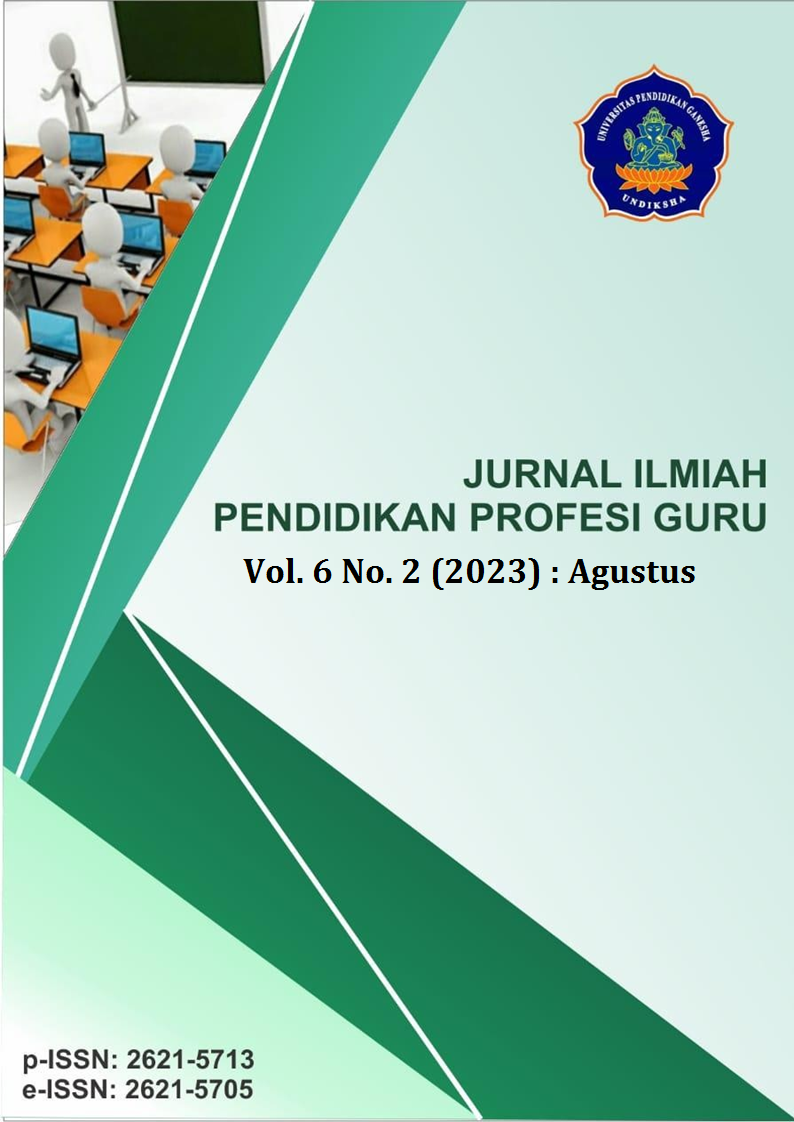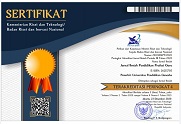Validitas Skala Minat Akademik Siswa Sekolah Menengah Atas dalam Pembelajaran Bahasa Inggris
DOI:
https://doi.org/10.23887/jippg.v6i2.52810Keywords:
Pembelajaran Bahasa Asing, Minat Akademik, Validasi SkalaAbstract
Minat akademik menentukan keaktifan partisipasi pelajar bahasa asing di kelas. Namun masih belum banyak penelitian mengungkapnya dengan baik karena langkanya skala baku mengenai minat akademis tentang bahasa asing di Indonesia. Penelitian bertujuan untuk menganalisis validitas skala peminatan Bahasa Inggris secara akademis yang ada di negara lain. Penelitian bersifat kuantitatif dengan data dikumpul, disandi dan diolah secara numerik. Rancangan studi ini menggunakan gagasan dari item response theory, yang menghubungkan dan membedakan antara observed variables dengan variabel laten. Responden sebanyak 315 pelajar dari SMA swasta, kelas XI dan XII, dengan perimbangan jenis kelamin yang merepresentasi kondisi populasi saat ini (134 laki-laki, 181 perempuan). Data diperoleh melalui kuesioner online kemudian diolah dengan uji butir, analisis faktor konfirmatori, dan uji reliabilitas. Hasil menunjukkan lima dimensi valid dan reliabel. Keseluruhan skala ini terdiri atas 29 indikator. Kelima dimensi temuan yakni emosi, nilai, pengetahuan, dan keterlibatan. Skala tersebut siap digunakan untuk mengukur minat akademik remaja Indonesia pemelajar Bahasa Inggris.
References
Ardianti, N. P. E., Nitiasih, P. K., Budiarta, L. G. R., & Adnyayanti, N. L. P. E. (2021). Enhancing students’ writing skill with problem-based learning video in pandemic situation. Jurnal Ilmiah Pendidikan Profesi Guru, 4(2), 165–172. https://doi.org/10.23887/jippg.v4i2.
Bai, B., Nie, Y., & Lee, A. N. (2022). Academic self-efficacy, task importance and interest: relations with English language learning in an Asian context. Journal of Multilingual and Multicultural Development, 43(5), 438–451. https://doi.org/10.1080/01434632.2020.1746317.
Csikszentmihalyi, M., & Hunter, J. (2014). Happiness in Everyday Life: The Uses of Experience Sampling. In Flow and the Foundations of Positive Psychology. Springer. https://doi.org/10.1007/978-94-017-9088-8_6.
Denner, J., Valdes, O., Dickson, D. J., & Laursen, B. (2019). Math interest and self-concept among latino/a students: Reciprocal influences across the transition to middle school. Journal of Adolescence, 75, 22–36. https://doi.org/10.1016/j.adolescence.2019.06.015.
Gogol, K., Brunner, M., Martin, R., Preckel, F., & Goetz, T. (2017). Affect and motivation within and between school subjects: Development and validation of an integrative structural model of academic self- concept, interest, and anxiety. Contemporary Educational Psychology, 49, 46–65. https://doi.org/10.1016/j.cedpsych.2016.11.003.
Halimi, A., Wijonarko, & Agustini, F. (2021). Analisis Pembelajaran Matematika Materi Bangun Ruang Kubus dan Balok dengan Menggunakan Model Konstruktivisme Berbasis Lingkungan. Jurnal Ilmiah Pendidikan Profesi Guru, 4(1), 10–16. https://doi.org/10.23887/jippg.v4i1.
Harackiewicz, J. M., Smith, J. L., & Priniski, S. J. (2016). Interest Matters: The Importance of Promoting Interest in Education. Policy Insights from the Behavioral and Brain Sciences, 3(2), 220–227. https://doi.org/10.1177/2372732216655542.
Hidi, S., & Renninger, K. A. (2006). The Four-Phase Model of Interest Development. Educational Psychologist, 41(2), 111–127. https://doi.org/10.1207/s15326985ep4102_4.
Høgheim, S., & Reber, R. (2015). Supporting interest of middle school students in mathematics through context personalization and example choice. Contemporary Educational Psychology, 42, 17–25. https://doi.org/10.1016/j.cedpsych.2015.03.006.
Hudaya, A. (2018). Pengaruh Gadget Terhadap Sikap Disiplin Dan Minat Belajar Peserta Didik. Research and Development Journal of Education, 4(2), 86–97. https://doi.org/10.30998/rdje.v4i2.3380.
Järvelä, S., & Renninger, K. A. (2014). Designing for learning: Interest, motivation, and engagement. In The Cambridge handbook of the learning sciences (pp. 668–685). Cambridge University Press. https://doi.org/10.1017/CBO9781139519526.040.
Jerome, I. R., & Schmidt, H. (2014). Situational interest and learning: Thirst for knowledge. Learning and Instruction, 32, 37–50. https://doi.org/10.1016/j.learninstruc.2014.01.002.
Jõgi, A.-L., Kikas, E., Lerkkanen, M.-K., & Mägi, K. (2015). Cross-lagged relations between math-related interest, performance goals and skills in groups of children with different general abilities. Learning and Individual Differences, 39, 105–113. https://doi.org/10.1016/j.lindif.2015.03.018.
Kessels, U., Heyder, A., Latsch, M., & Hannover, B. (2014). How gender differences in academic engagement relate to students’ gender identity. Educational Research, 56(2), 220–229. https://doi.org/10.1080/00131881.2014.898916.
Krapp, A. (1999). Interest, motivation and learning: An educational-psychological perspective. European Journal of Psychology of Education, 14(1), 23–40. https://doi.org/10.1007/BF03173109.
Kumaidi, K. (2021). Validitas Prediktif Skala Minat Kejuruan dan Potensi Belajar Terhadap Presentasi Belajar Siswa SMK. Jurnal Pendidikan Teknologi Dan Kejuruan, 8(2), 164–173. https://doi.org/10.23887/jptk-undiksha.v18i2.37013.
Lazarides, R., Gaspard, H., & Dicke, A.-L. (2019). Dynamics of classroom motivation: Teacher enthusiasm and the development of math interest and teacher support. Learning and Instruction, 60, 126–137. https://doi.org/10.1016/j.learninstruc.2018.01.012.
Lee, J., & Durksen, T. L. (2018). Dimensions of academic interest among undergraduate students: passion, confidence, aspiration and self-expression. Educational Psychology, 38(2), 120–138. https://doi.org/10.1080/01443410.2017.1342770.
Lee, J., & Durksen, T. L. (2021). Global academic interest scale for undergraduate and graduate students. Journal of Psychoeducational Assessment, 39(2), 182–196. https://doi.org/10.1177/0734282920946144.
Lee, W., Lee, M., & Bong, M. (2014). Testing interest and self-efficacy as predictors of academic self-regulation and achievement. Contemporary Educational Psychology, 39(2), 86–99. https://doi.org/10.1016/j.cedpsych.2014.02.002.
Luo, Z., Dang, Y., & Xu, W. (2019). Academic Interest Scale for Adolescents: Development, Validation, and Measurement Invariance with Chinese Students. Frontiers in Psychology, 10, 1–14. https://doi.org/10.3389/fpsyg.2019.02301.
Maurice, J. von, Dörfler, T., & Artelt, C. (2014). The Relation between Interests and Grades: Path Analyses in Primary School Age. International Journal of Educational Research, 64(1), 1–11. https://doi.org/10.1016/j.ijer.2013.09.011.
Mazer, J. P. (2013). Associations among teacher communication behaviors, student interest, and engagement: a validity test. Communication Education, 62(1), 86–96. https://doi.org/10.1080/03634523.2012.731513.
Prakoso, A. R., Seriardana, P., & Adnyani, L. D. S. (2021). Peningkatan Kualitas Pembelajaran Explanation Text Menggunakan Model Problem Based Learning Berbasis Lesson Study. Jurnal Ilmiah Pendidikan Profesi Guru, 4(1), 76–84. https://doi.org/10.23887/jippg.v4i1.
Renninger, K. A., & Hidi, S. E. (2019). Interest development and learning. In K. A. Renninger & S. E. Hidi (Eds.), The Cambridge handbook of motivation and learning (pp. 265–290). Cambridge University Press. https://doi.org/10.1017/9781316823279.013.
Roloff, J., Klusmann, U., Lüdtke, O., & Trautwein, U. (2020). The Predictive Validity of Teachers’ Personality, Cognitive and Academic Abilities at the end of High School on Instructional Quality in Germany: A Longitudinal Study. Aera Open, 6(1), 2332858419897884. https://doi.org/10.1177/2332858419897884.
Rotgans, J. I., & Schmidt, H. G. (2018). How individual interest influences situational interest and how both are related to knowledge acquisition: A microanalytical investigation. The Journal of Educational Research, 111(5), 530–540. https://doi.org/10.1080/00220671.2017.1310710.
Schäfer, P. J., Corona-Strauss, F. I., Hannemann, R., Hillyard, S. A., & Strauss, D. J. (2018). Testing the Limits of the Stimulus Reconstruction Approach: Auditory Attention Decoding in a Four-Speaker Free Field Environment. Trends in Hearing, 22, 1–12. https://doi.org/10.1177/2331216518816600.
Schurtz, I. M., Pfost, M., Nagengast, B., & Artelt, C. (2014). Impact of social and dimensional comparisons on student’s mathematical and English subject-interest at the beginning of secondary school. Learning and Instruction, 34, 32–41. https://doi.org/10.1016/j.learninstruc.2014.08.001.
Simplicio, J. S. C. (2019). Strategies to Improve Online Student Academic Success and Increase University Persistence Rates. Education, 139(3), 173–177.
Srikoon, S., Apaivatin, R., Monsang, P., Khamngoen, S., & Malaitao, T. (2020). Construct Validity of Assessing Interest in STEM Content Scale. Education Research International, 1–7. https://doi.org/10.1155/2020/1696494.
Su, R. (2020). The three faces of interests: An integrative review of interest research in vocational, organizational, and educational psychology. Journal of Vocational Behavior, 116, 1–15. https://doi.org/10.1016/j.jvb.2018.10.016.
Suroto, S., Prakoso, B. B., Ridwan, M., & Juniarisca, D. L. (2021). Berpikir Kritis dan Hubungannya dengan Prestasi Akademik Calon Guru Pendidikan Jasmani Olahraga dan Kesehatan. Jurnal Olahraga Pendidikan Indonesia, 1(1), 46 – 59. https://doi.org/10.54284/jopi.v1i1.5.
Tang, L. I., & Toyama, M. (2016). Change trajectories of college students’ interest in their major: Development of a domain learning interest scale for college students. Japanese Journal of Educational Psychology, 64(2), 212–227. https://doi.org/10.5926/jjep.64.212.
Tibaná-Herrera, G., Fernández-Bajón, M. T., & Moya-Anegón, F. de. (2018). Global analysis of the E- learning scientific domain: a declining category? Scientometrics, 114, 675–685. https://doi.org/10.1007/s11192-017-2592-7.
Trautwein, U., Lüdtke, O., Nagy, N., Lenski, A., Niggli, A., & Schnyder, I. (2015). Using individual interest and conscientiousness to predict academic effort: Additive, synergistic, or compensatory effects? Journal of Personality and Social Psychology2, 109(1), 142–162. https://doi.org/10.1037/pspp0000034.
Viljaranta, J., Tolvanen, A., Aunola, K., & Nurmi, J.-E. (2014). The developmental dynamics between interest, self-concept of ability, and academic performance. Scandinavian Journal of Educational Research, 58(6), 734–756. https://doi.org/10.1080/00313831.2014.904419.
Zhang, J., Dong, Z., & Yang, X. (2018). The predictors of academic interest: fluid intelligence, openness, and their interaction. Educational Psychology, 39(1), 1–19. https://doi.org/10.1080/01443410.2018.1514103.
Downloads
Published
How to Cite
Issue
Section
License
Copyright (c) 2023 Teresa Angelina Kaluge, Sisilia Setiawati Halimi

This work is licensed under a Creative Commons Attribution-ShareAlike 4.0 International License.

Jurnal Ilmiah pendidikan profesi guru is licensed under a Creative Commons Attribution-ShareAlike 4.0 International License.






